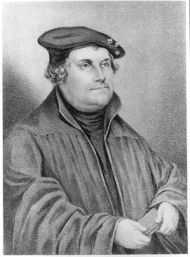This Sunday is Halloween. But more importantly, it’s Reformation Day—when the church celebrates and commemorates October 31, 1517. It was on this day (a Saturday) that a 33-year-old theology professor at Wittenberg University walked over to the Castle Church in Wittenberg and nailed a paper of 95 theses to the door, hoping to spark an academic discussion about their contents. In God’s providence and unbeknownst to anyone else that day, it would become a key event in igniting the Reformation.
I thought it might be helpful to ask a few questions of Carl Trueman, Professor of Historical Theology and Church History, and Academic Dean, at Westminster Theological Seminary in Philadelphia. Dr. Trueman wrote his dissertation on Luther’s Legacy, teaches on Luther’s life and theology, and is writing the volume on Luther for the Theologians on the Christian Life series, forthcoming from Crossway, edited by Steve Nichols and me.
Had Luther ever done this before—nail a set of theses to the Wittenberg door? If so, did previous attempts have any impact?
I am not sure if he had ever nailed up theses before, but he had certainly proposed sets of such for academic debate, which was all he was really doing on October 31, 1517. In fact, in September of that same year, he had led a debate on scholastic theology where he said far more radical things than were in the Ninety-Five Theses. Ironically, this earlier debate, now often considered the first major public adumbration of his later theology, caused no real stir in the church at all.
What was the point of nailing something to the Wittenberg door? Was this a common practice?
It was simply a convenient public place to advertise a debate, and not an unusual or uncommon practice. In itself, it was no more radical than putting up an announcement on a public notice board.
What precisely is a “thesis” in this context?
A thesis is simply a statement being brought forward for debate.
What was an “indulgence”?
An indulgence was a piece of paper, a certificate, which guaranteed the purchaser (or the person for whom the indulgence was purchased) that a certain amount of time in purgatory would be remitted as a result of the financial transaction.
At this point did Luther have a problem with indulgences per se, or was he merely critiquing the abuse of indulgences?
This is actually quite a complicated question to answer.
First, Luther was definitely critiquing what he believes to be an abuse of indulgences. For him, an indulgence could have a positive function; the problem with those being sold by Johann Tetzel in 1517 is that remission of sin’s penalty has been radically separated from the actual repentance and humility of the individual receiving the same.
Second, it would appear that the Church herself was not clear on where the boundaries were relative to indulgences, and so Luther’s protest actually provoked the Church into having to reflect upon her practices, to establish what was and was not legitimate practice.








